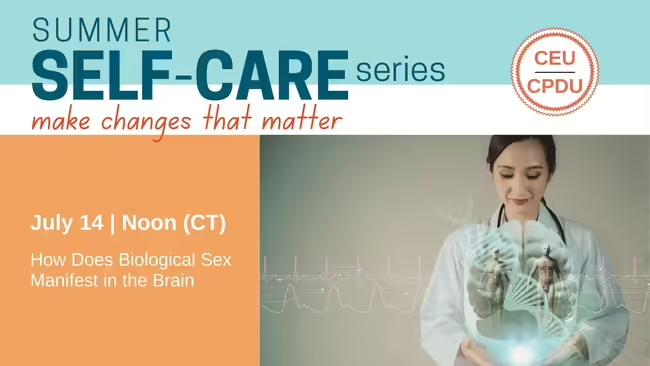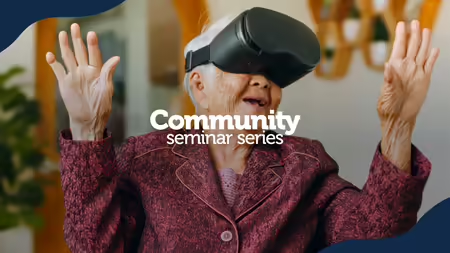
How Does Biological Sex Manifest in the Brain?
July 14 | Noon
A person's biological sex plays into many parts of their lives: identity, behavior, expectations of others, physical health. Our biological sex affects brain health and function throughout our lives. Still, misconceptions exist. We’ll sort fact from fiction when it comes to biological sex and brain development. Presenter: Coltan Parker, Neuroscience Program.
If an accommodation is needed to participate in the program, please email Chelsey Byers at clbyers@illinois.edu. Early requests are strongly encouraged to allow sufficient time to meet access needs.
You might enjoy learning about additional health topics in this research-based series:
Gain insights into complex health issues as health science experts from University of Illinois deliver forward-thinking, holistic solutions for addressing today's health challenges in a series co-hosted by University of Illinois Extension and Interdisciplinary Health Sciences Institute. All webinars in this series are free. All courses are eligible for CEUs and CPDUs.
Understanding How Memory Works
June 23 | Noon
Your memories are one of the most important pieces that make you, you! But, have you ever wondered how our brain creates and stores memories? Discover the complexities of human memory in this free online webinar. Using several examples, we’ll consider interesting theories and break down what scientists understand about human memory. Presenter: Corinne Cannavale, Neuroscience Program.
Our Chemical Environment: How to Read Product Labels and Understand Marketing Terms
June 30 | Noon
Endocrine disrupting chemicals are all around us, so how can we reduce our exposure to them? Does replacing products in our homes with "natural" products reduce exposure? In this webinar, we’ll learn what the standard terms used on product labels mean and help you determine which strategies are best for you and your family. Presenter: Megan Woodbury, Neuroscience Program.
The Pros and Cons of Probiotics
July 7 | Noon
Probiotics are in many drinks and health-conscious foods, but what does the research say about their effectiveness? Can we believe the hype? Learn how to read a probiotic label, the current state of probiotic and prebiotic research, how probiotics impact the gut microbiome, and which health claims to dismiss as fake. Presenter: Join Breanna Metras, Division of Nutritional Sciences.
How Does Biological Sex Manifest in the Brain?
July 14 | Noon
A person's biological sex plays into many parts of their lives: identity, behavior, expectations of others, physical health. Our biological sex affects brain health and function throughout our lives. Still, misconceptions exist. We’ll sort fact from fiction when it comes to biological sex and brain development. Presenter: Coltan Parker, Neuroscience Program.
Healthy Arteries, Healthy Brain: Understanding Cerebrovascular Health
July 21 | Noon
The brain is enveloped by a vast network of blood vessels that supply the energy for us to breathe, move, feel, and think. As we age, these vessels are susceptible to changes which may impact our brain and cognition. Learn how to keep your brain healthy throughout the aging process by understanding how blood is supplied to the brain and why that’s important to its function. Presenter: Grace Clements, Psychology Department (Cognitive Neuroscience).
No Sugarcoating It: The Ins and Outs of Diabetes
July 28 | Noon
Is diabetes preventable? Learn how diabetes affects our body, as well as dietary and other lifestyle modifications for diabetes prevention and management. Presenter: Ru Liu, Division of Nutritional Sciences.
Harnessing Technology to Improve Healthcare Communications with Patients
August 4 | Noon
Electronic Health Record (EHR) systems are revolutionizing health care, potentially improving patient and provider collaboration and patient self-care. A barrier to realizing this potential is that information in EHRs can be too technical and not patient-specific. Patients may misunderstand this information, especially numeric information presented without an explanation. Moreover, providers rarely have enough time to consistently use patient-centered communication when talking to their patients. The webinar will discuss how patients can more effectively use health information to communicate to their health care provider and how technology can provide support for busy providers. Presenter: Renato Azevedo, Educational Psychology.
Our Chemical Environment: Racial Disparities in Phthalate Exposure
August 11 | Noon
Phthalates are toxic chemicals we encounter through daily contact with a variety of products. Some populations have higher exposure to phthalates than others, exposing racial health disparities. This webinar describes how higher exposure early in life may persist in midlife affecting the severity of hot flashes. Presenter: Brandi Smith, Health and Medical Informatics.
The Science of Stem Cells: Fact Versus Fiction
August 18 | Noon
The scientific community is investing billions of dollars in stem cell research, but what are they, and why are researchers so interested in them? Moreover, is stem cell research legal? In this webinar, we’ll uncover popular myths surrounding stem cell research and its applications in modern-day medicine. Presenter: Apurva Godbole.
How Bias and Racism Impact Health Systems and the Patient Experience
August 25 | Noon
Every day, patient care is shaped by adverse influences that may result in workplace trauma and second-rate care. By understanding the origin of these influences, organizations can recognize them in staff and provide growth opportunities for both patients and healthcare professionals. Presenter: Erica Noel, Health Communications.
